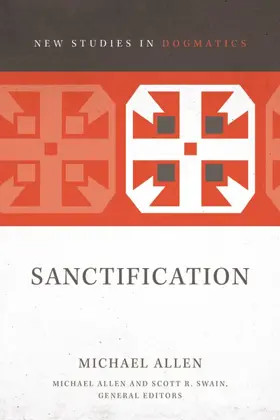

Sanctification
Pages
304
Publisher
Zondervan
Published
10/24/2017
ISBN-13
9780310491460
The holy has been defined existentially and sociologically, and churches too often allow their expectations regarding holiness to be prompted by existential aspirations or the social mores of the Christian community. Perhaps it is not surprising that many view holiness as accidental or expendable, even as a legalistic and conformist posture opposed to the freedom of the gospel. But sanctification is one of the gifts of the gospel of Jesus Christ, so we must think about the way in which he makes his redeemed holy as a grace.
Sanctification, the latest volume in the New Studies in Dogmatics series, patiently defines holiness in theological terms by tending to its connections with core Christian doctrines such as the character of God, the nature of creation, and the covenantal shape of life with God. It then considers the ways in which the gospel of Jesus not only prompt us to holy action but provides holiness as one of its blessings. Finally, it attends to the ways in which the gift of sanctification relates to various human instruments and means, so that we can appreciate its connection to human nature, creaturely responsibility, and the pedagogy of exemplars and of law. Sanctification offers a Christ-centered account of sanctification by viewing the doctrine within its wider canonical and creedal context, hoping to bring its distinctly Christian definition and thoroughly gracious character into greater relief.
New Studies in Dogmatics seeks to retrieve the riches of Christian doctrine for the sake of contemporary theological renewal. Following in the tradition of G. C. Berkouwer’s Studies in Dogmatics, this series will provide thoughtful, concise, and readable treatments of major theological topics, expressing the biblical, creedal, and confessional shape of Christian doctrine for a contemporary evangelical audience. The editors and contributors share a common conviction that the way forward in constructive systematic theology lies in building upon the foundations laid in the church’s historic understanding of the Word of God as professed in its creeds, councils, and confessions, and by its most trusted teachers.
Sanctification, the latest volume in the New Studies in Dogmatics series, patiently defines holiness in theological terms by tending to its connections with core Christian doctrines such as the character of God, the nature of creation, and the covenantal shape of life with God. It then considers the ways in which the gospel of Jesus not only prompt us to holy action but provides holiness as one of its blessings. Finally, it attends to the ways in which the gift of sanctification relates to various human instruments and means, so that we can appreciate its connection to human nature, creaturely responsibility, and the pedagogy of exemplars and of law. Sanctification offers a Christ-centered account of sanctification by viewing the doctrine within its wider canonical and creedal context, hoping to bring its distinctly Christian definition and thoroughly gracious character into greater relief.
New Studies in Dogmatics seeks to retrieve the riches of Christian doctrine for the sake of contemporary theological renewal. Following in the tradition of G. C. Berkouwer’s Studies in Dogmatics, this series will provide thoughtful, concise, and readable treatments of major theological topics, expressing the biblical, creedal, and confessional shape of Christian doctrine for a contemporary evangelical audience. The editors and contributors share a common conviction that the way forward in constructive systematic theology lies in building upon the foundations laid in the church’s historic understanding of the Word of God as professed in its creeds, councils, and confessions, and by its most trusted teachers.
Reviews
This book may be frustrating to some. For a book that goes by the title of 'Sanctification', most of the book is preparatory work before the author ever gets to the subject of the Christian's sanctification. Allen states that his aim is to thouroughly place the idea of holiness within the realm of God. He certainly carries that emphasis all the way through to the end. But most chapters droned on, dealing with various interlocutors at length that seemed like fringe issues, in order to make simple points that could have been made much more effectively by stating it clearly and succintly. I would think that laboring in the truth and for clarity would be ideal, even in Christian dogmatics.
I completely understand the benefit of polemics, but much of what Allen does in this book was completely lost on me. Perhaps the discussions contained here are more beneficial to those whose profession is academic dogmatics, but I can't imagine it is of much to the church.
To be sure, there is some golden moments along the way, and I thoroughly appreciated some of the more direct discussion he fostered on the subject of grace, but in my opinion (which honestly doesn't count for much), they are few and far between.
